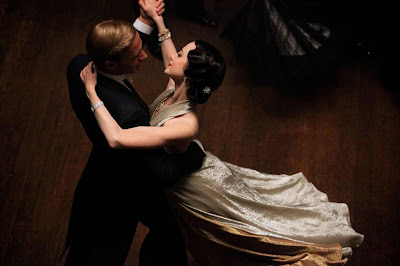Simpson has been dead for nearly 26 years; her ex-king husband, the Duke of Windsor, has been gone for nearly 40. Neither had a good end but their story lives on as one of the most reproduced of royal sagas on stage and screen for most of the 20th century.
Now, 75 years after the abdication crisis, Madonna‘s movie, “W.E.” helps shift the image of Simpson from the mannish-but-chic party crasher at the palace to a more ambivalent figure, by turns despised, traduced, envied and pitied even by her critics.
“W.E.” starts in the year 1998, when Manhattan is abuzz with anticipation about the upcoming auction of the estate of the Duke and Duchess of Windsor. But the auction is far more than a diversion for Wally Winthrop (Abbie Cornish), a transplanted Southerner trapped in an unhappy and abusive marriage. Transfixed by the exquisite artifacts of the Windsors’ lives, Wally becomes obsessed with the love story of Wallis Simpson (Andrea Riseborough), the chic, charismatic American who captured the heart of King Edward VIII (James D’Arcy). As she learns more about the sacrifices Wallis made in choosing to be with Edward, Wally finds the courage to follow her own heart and create her own happiness.
Writer and director Madonna had been developing the idea for “W.E.” for many years. She had a longstanding fascination with the Duke and Duchess of Windsor, yet she was not interested in making a conventional biopic. She sought instead to capture the essence of their romance and convey her interpretation of one of the greatest love stories of the 20th Century. She says, “Truth is subjective. Everything I have to say about the Duke and Duchess is the conclusion I came to after all my research. I wanted to present a more well-rounded portrayal of Wallis than was commonly known. I created the Wally character because the movie needed a point of view. Wally goes on a journey thinking this is the greatest love story only to realize that it wasn’t such a perfect love and that both of them made huge sacrifices. Strangely enough, Wallis seemed to make more of a sacrifice than Edward did.”
Madonna comments, “I couldn’t get my mind off the fact that a man gave up the throne for a woman. From my perspective, men since the beginning of time have fought to get on the throne. Men are power-seeking animals, so why would this man run away from power? Why would he give it up? What drove him to do that? If it was for a woman and it was for love, what did this woman have that would inspire him to make such a great sacrifice? I wanted to know more about her.”
Fascinated by this woman and this powerful love story, Madonna spent two years writing her script, and although “W.E.” is, in part, a fictionalized story, she also spent this time heavily researching the project. She devoured every book published on Wallis and Edward, watched every documentary and broadcast available and interviewed countless people who knew Wallis and Edward.
During her research, two elements became particularly important. Wallis and Edward wrote to each other constantly throughout their relationship, sometimes even when staying in the same house. These letters are used throughout the film and even provide the title “W.E.” due to the way they would sign off their letters with their initials. “I found the letters very insightful because I think people reveal a lot about themselves in a letter. Things you don’t get from a book – the way they speak to each other, the nicknames they gave each other,” concludes Madonna.
“W.E.” will be shown exclusively at Ayala Malls Cinemas – Glorietta 4, Greenbelt 3 and Trinoma – starting Sept. 12.

